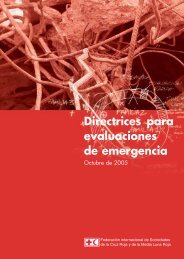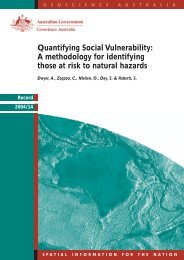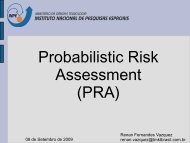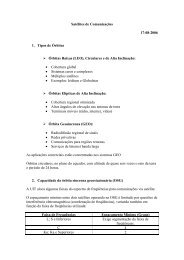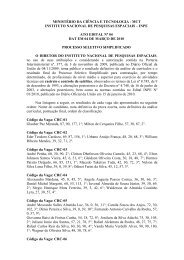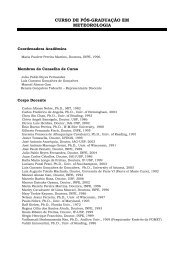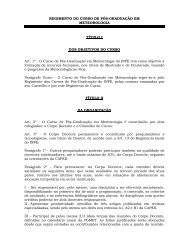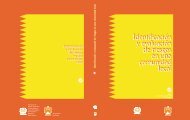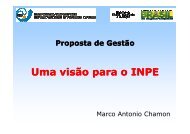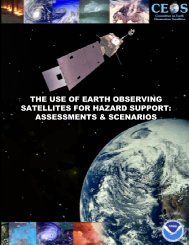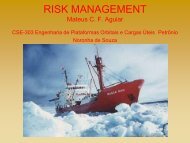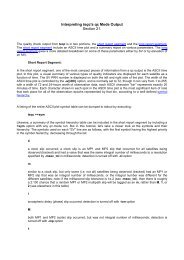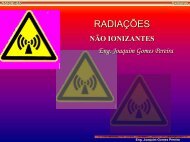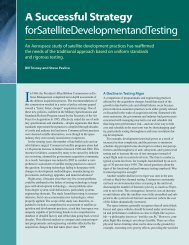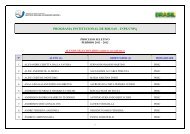Living with Risk. A global review of disaster reduction initiatives
Living with Risk. A global review of disaster reduction initiatives
Living with Risk. A global review of disaster reduction initiatives
You also want an ePaper? Increase the reach of your titles
YUMPU automatically turns print PDFs into web optimized ePapers that Google loves.
6<br />
<strong>Living</strong> <strong>with</strong> <strong>Risk</strong>: A <strong>global</strong> <strong>review</strong> <strong>of</strong> <strong>disaster</strong> <strong>reduction</strong> <strong>initiatives</strong><br />
the Rio Earth Summit, the UN International<br />
Conference on Water and the Environment<br />
(ICWE) was held in January 1992. The<br />
Dublin Statement (www.wmo.ch/web/homs/<br />
documents/english/icwedece.html) on Water<br />
and Sustainable Development establishes four<br />
guiding principles, as well as an agenda for<br />
action, which have guided academic and political<br />
discussions ever since.<br />
One <strong>of</strong> the recommendations relates to the<br />
World Water Assessment Programme<br />
The World Water Assessment Programme/World Water<br />
Development Report (WWAP/WWDR), is administered<br />
by UNESCO, and is a UN-wide effort, set up upon the<br />
request <strong>of</strong> governments, to pool UN resources regarding<br />
world water management. WWAP will assist developing<br />
countries to strengthen their capacity to assess their own<br />
water situation. The WWDR will target all those<br />
involved in the formulation and implementation <strong>of</strong><br />
water-related policies and investments.<br />
More information is available at:<br />
www.unesco.org/water/wwap<br />
protection against natural <strong>disaster</strong>s, and calls<br />
for proactive measures to reverse the current<br />
trends. In particular, the Dublin Statement<br />
identifies climate change and sea level rise as<br />
factors that would exacerbate <strong>disaster</strong> risk,<br />
"threatening the apparent security <strong>of</strong> existing<br />
water resources". Chapter 18 <strong>of</strong> Agenda 21<br />
covered the "protection <strong>of</strong> the quality and<br />
supply <strong>of</strong> freshwater resources: application <strong>of</strong><br />
integrated approaches to the development<br />
management and use <strong>of</strong> water resources" <strong>with</strong><br />
ample reference to <strong>disaster</strong>s and hydrological<br />
extreme events.<br />
implement these commonly agreed principles. For<br />
example, the WMO, has set out to promote flood<br />
management activities in the context <strong>of</strong> Integrated<br />
Water Resources Management (IWRM).<br />
The <strong>reduction</strong> <strong>of</strong> vulnerability to floods and<br />
droughts will have to be included in the many<br />
facets <strong>of</strong> the freshwater agenda. These include<br />
the integration <strong>of</strong> all stakeholders in river basin<br />
management, the institutional framework to<br />
effectively manage water demand and international<br />
trade arrangements, which respect<br />
national water regulations. Such water<br />
management processes need to go hand in<br />
hand <strong>with</strong> an increased delegation <strong>of</strong> responsibility<br />
and means to local authorities.<br />
At a <strong>global</strong> level, the upcoming WSSD, the<br />
United Nations International Freshwater Year<br />
2003, as well as the third World Water Forum,<br />
to be held in March 2003, will provide opportunities<br />
to further develop these concepts.<br />
Research in support <strong>of</strong> Integrated Water<br />
Resource Management and Comprehensive<br />
Disaster <strong>Risk</strong> Management .<br />
WADI (Water-related Disasters) is a recent<br />
research initiative <strong>of</strong> the Potsdam Institute<br />
for Climate Impact Research (PIK) that<br />
responds directly to humankind's increasing<br />
vulnerability to water-related <strong>disaster</strong>s.<br />
It provides a scientific basis for adaptation<br />
and mitigation options for sustainable transition<br />
programs that are developed in<br />
conjunction <strong>with</strong> the various stakeholders.<br />
See more at: www.pink-potsdam.de<br />
296<br />
More recently, in March 2000, the Second<br />
World Water Forum, launched the World Water<br />
Vision and a Ministerial Declaration on Water<br />
Security in the 21st Century was developed.<br />
The declaration identifies seven challenges for<br />
the <strong>global</strong> community, including the "management<br />
<strong>of</strong> risk - to provide security from floods,<br />
droughts, pollution and other water related<br />
hazards."<br />
A vast body <strong>of</strong> knowledge exists on water management,<br />
and flood and drought management in<br />
particular. An increasing focus in local, national<br />
and international programs is on best ways to<br />
The gender agenda<br />
Fourth World Conference on Women and<br />
follow-up<br />
The Beijing Platform for Action, adopted at<br />
the Fourth World Conference on Women<br />
(1995) recognised that many women are<br />
particularly affected by environmental <strong>disaster</strong>s,<br />
disease and violence. It requested governments<br />
to "promote knowledge <strong>of</strong> and sponsor<br />
research on the role <strong>of</strong> women, particularly<br />
rural and indigenous women, in food gathering



